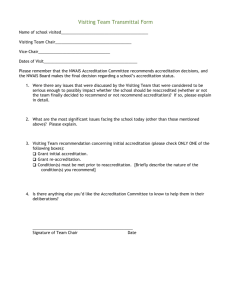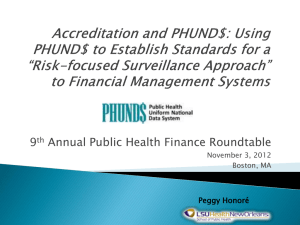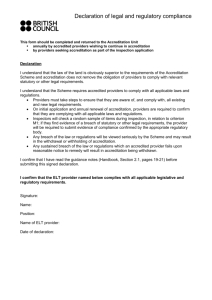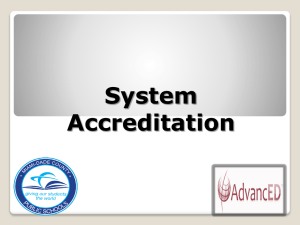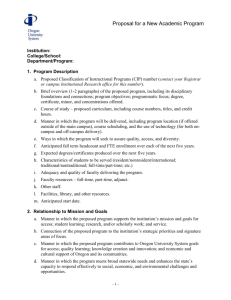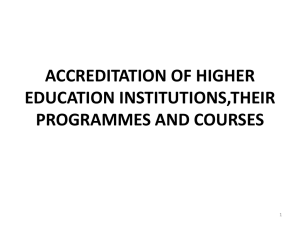This guide must be read in conjunction with the Application
advertisement
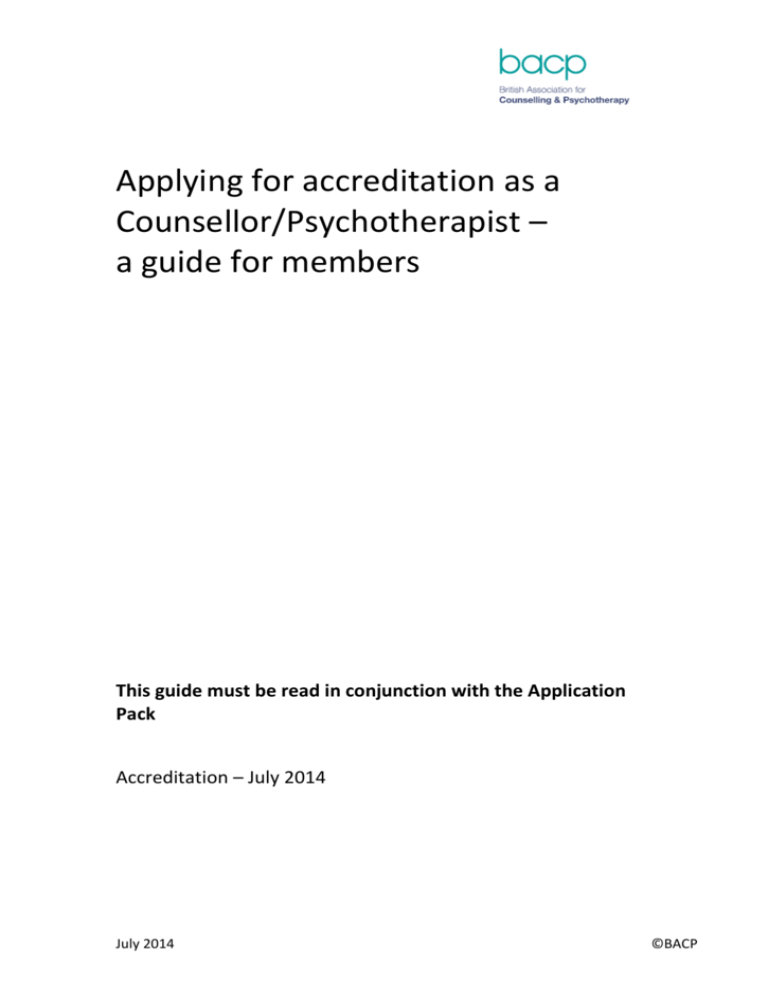
Applying for accreditation as a Counsellor/Psychotherapist – a guide for members This guide must be read in conjunction with the Application Pack Accreditation – July 2014 July 2014 ©BACP Our requirements for accreditation Putting your application together You can apply for accreditation as a Counsellor/Psychotherapist as soon as you believe you meet the criteria. You have to be able to demonstrate a combination of training, client hours and reflective practice. Although we really appreciate how important your work is to you and the care and attention to detail you apply, you don’t need to provide your application in any ‘fancy’ format – just a simple clip or single plastic wallet for each copy is fine. Please don’t staple or bind your applications or put them in heavy folders – we will only have to remove these. Similarly, please don’t put each individual sheet in a plastic wallet. You don’t have to apply by a specific deadline – your training doesn’t ‘runout’ or ‘expire’. As of 1st September 2014 you can only apply for accreditation if you are a registered member of BACP. There are 2 different ‘routes’ to applying for accreditation and which one you choose depends on your training. Most of the criteria are identical regardless of which route you take and the standard that you need to meet is the same. You can download a copy of the criteria from the accreditation section of the website. The criteria are also contained in the full application pack but be aware this is a big document to print out so in the first instance you may just want to download the criteria. You must send us two applications – one original which has all the original signatures on it and then one complete copy. We would always recommend you keep a copy for yourself as we don’t return applications. We need two copies as we send one out for assessment and the other remains safely with the office until the whole application process is complete. Make sure the pages are in order, following the numbering of the criteria. You don’t need to send us blank, unused or instruction pages from the application pack. When you send in your application you must pay the correct fee which is in force at the time. Fees are shown in the application pack and also on the website. You can either complete the card payment slip in the application pack, include a cheque made payable to BACP or call our Customer Service Team on 01455 883300 to pay by card. Making an on-line application As well as a paper application form, there is an on-line system for making your application. The criteria are identical however you apply, but it works in a slightly different way. This leaflet will be helpful if you are applying on-line but doesn’t cover specific issues about using the system. If you want to look at, or use the on-line system go to this web address; www.bacp.co.uk/accreditation and then select ‘accreditation application process’ from the left hand menu. Please read the instructions on the online application screens. They explain in detail how to use the system. There is a separate guide to applying online which you can access on the accreditation section of the website. Making an application from outside the UK It takes about 4 months for us to process your application. We can’t give you a definite time as it depends on how many applications we receive at any time. All applications are dealt with in strict date order so please don’t ask us to prioritise your application. First the office team check that all the parts of the application are complete so that the assessors have a full application to assess. If there are any queries, they will contact you – generally by e-mail-so make sure your e-mail address is correct on your application and it is an address that you check regularly. Once your application is complete it is sent to one of our assessors. After this first assessment your application may go for a further quality check with a ‘moderator’. This is a second assessment designed to ensure that standards are maintained. As soon as we have a final result in the office, we send it out to you by post. We are happy to accept applications from members who are living and working outside the UK. Providing your application meets the criteria, we are not concerned where you trained or work(ed). Our assessors are all practicing therapists and work in a variety of modalities and settings. They are also supervisors and/or trainers . This means they are up to date with current practice issues. Sometimes we will ask you for a little more information than we would for UK based/trained applicants but often this is simply because of different terminology in the counselling/psychotherapy field across different countries. All our assessors and office staff attend regular meetings to ‘standardise’ their checking and assessing processes. Processing your application When we receive your application we will acknowledge this in writing. July 2014 If we have to withdraw your application at any stage we will keep an administration fee. The amount will depend on what stage your application is at. ©BACP Honesty & Plagiarism Complaints & Eligibility You must sign a declaration of honesty confirming that everything you tell us in your application is true. Your registered membership must be paid up to date or a current direct debit must be in place. If a payment has failed or you have not paid at all, or your registration is not current, your application will not be processed until this is resolved. We ask that all your work in your application is your own unless you have fully acknowledged and referenced this. We take collusion and plagiarism very seriously and we monitor applications to ensure this does not happen. We know that colleagues and friends will work together on applications and we do encourage this, however, sharing of work, copying or working to templates is outside both the spirit and the application of the Ethical Framework. If it is discovered, we will investigate and take the necessary steps, up to and including referral for consideration under the Professional Conduct Procedure or the Article 12.6 Procedure as appropriate. Your application will also be withdrawn from the process. The criteria in detail While you read this section, you may find it helpful to have a copy of the criteria or the full application pack to hand. There is basic guidance about completing the forms in the pack – this document provides additional information and clarification on some of the common queries that we receive as well as clarification on key points so that you provide the correct information and to help you fully understand what is required at each point. In the application pack you will see this symbol where there is specific help in this guide. July 2014 If you are the subject of a complaint in relation to your work as a counsellor/psychotherapist or in another role that might have a bearing on this work you should tell us about this. It does not automatically mean that your application could not be processed but we would need to consider it carefully. As a registered member of BACP you must sign to agree to abide by our Ethical Framework. Insurance You must have indemnity insurance for all your work. This may be your own personal insurance if you are in private practice or it may be through your employer, even if you work as a volunteer. It is your responsibility to check that you are covered in each place that you work. We do not need to see a copy of your insurance certificate. Some of our overseas members are not able to access appropriate insurance. In this instance you should explain what arrangements you have in place to cover you in the event of legal action being taken against you by a client. You can put this in a covering letter if you wish or attach a separate piece of paper to your application. ©BACP Your training You need to demonstrate that you have undertaken a counselling or psychotherapy core practitioner training. Training in other areas such as psychology, social work, nursing, HR, hypnotherapy, NLP, religious ministry and alternative health, whilst related and of great help, are not eligible. Training in supervision must not be included. Distance or on-line learning courses are not eligible. If you have completed a BACP accredited course you still need to supply a verified certificate. Also, if your certificate doesn’t say on it that this is the BACP accredited course, you must ask the course to provide you with a letter confirming you completed the accredited course. Some courses allow students to go direct onto a second or third year of a course (you might see this called an APL or APEL agreement) but we don’t always have an agreement that students joining in this way can claim to have completed the accredited course so we need to know that you have successfully completed all the relevant parts. The office team are not being awkward if they insist on this evidence – they are simply applying the criteria and standard that is set. It is your responsibility to source this information. If you are using non-accredited training courses to apply under route 4.2 you can combine courses together to meet the 450 hour requirement. A typical example might be a Certificate level course combined with a Diploma level course. As long as all the criteria are met July 2014 when the courses are considered overall, you can use these. You must have had an integral placement on at least one of the courses you use. By this we mean assessed counselling/psychotherapy work, with genuine clients (not other students) carried out as part of your course and which you were required to successfully pass in order to graduate from that course. Whichever route you apply under, all the courses you include in your application must be completed – you must have passed and been given the award. Certificates of attendance are not sufficient and courses where there was no assessment of your competence at the end are also not eligible. You cannot use part completed courses either – for example one year of a degree course. We do not operate a ‘credits’ system. When we refer to taught hours, we mean lectures, seminars, tutorials and practical sessions which are lead by a tutor. We don’t mean private individual or group study, research, writing assignments or placements. You can get a verified certificate by taking a copy and writing; This is a true copy of the original document And then you and either your proposer or supervisor sign this. If your name on our records is different from that on your certificates you will also need to send us formal evidence of that change, such as marriage/civil partnership certificate or deed poll. ©BACP Practice ‘Counselling’ and ‘Psychotherapy’ are umbrella terms covering a range of talking therapies delivered by professionally trained and qualified practitioners within a context of confidentiality and clear ethical boundaries. Counsellors/Psychotherapists enter into a mutually contracted therapeutic relationship with their clients that has as its purpose effective change or enhanced wellbeing. Therapeutic work may be short or long term and is respectful of the clients’ wishes, supporting them as they identify their own goals, come to their own conclusions and reach their own decisions. You can use any practice towards your application providing it meets the description above and is supervised to the required level. Helpline or counselling skills work is not suitable for this accreditation scheme. Members working as Psychological Wellbeing Practitioners (PWPs) should be aware that this work is not eligible. You can use paid or voluntary work. You can use face to face, telephone or online counselling. You can use work with adults, couples, groups (to include families) or children and young people. You can start counting this 3 year period from when you see your first client, which may include your placement as a student. Your ‘diary of current practice’ should show a similar number of hours for your chosen four week period as you claim you undertake each month. If it is significantly different we will write to you to query this. If your sessions are 50 minutes then you can claim a ‘therapeutic hour’. If your sessions are shorter or longer than this, then you should count the actual time the sessions are scheduled for. You must show a minimum of 3 years of practice and a maximum of 6 years. These years of practice do not need to follow on from each other and do not need to be calendar years. So for example, you could show January to December 2002, May 2003 to April 2004 and July 2010 to June 2011. You can include your practice hours from your placement providing they meet the criteria. At least 150 of your practice hours must be post-training. We class post-training as beginning from the date on the most recent certificate that you use towards the training requirements. You must be in practice when you apply. This means you must be seeing, at the very least, one client on a regular basis. You need to have been in practice for a minimum of 3 years when you apply. July 2014 ©BACP Supervision You must be able to show a minimum of 1 ½ hours of supervision per month for each month of practice where you are seeing clients. It is important that you have a contract in place for this. You must not average supervision out across the year to meet the requirement. For this reason, arrangements such as one hour every 3 weeks or 2 hours every 6 weeks won’t meet the requirement, unless combined with another arrangement. If you work in more than one place, each place you work must be supervised, but you do not need to have 1 ½ hours for each place. You can combine individual, group and peer supervision to meet the minimum requirement. You can use face-to-face, phone or on-line supervision. However, remember that there is a formula for working out how much time you can claim for group and peer supervision; Do not count the ‘facilitator’ or ‘group supervisor’ for group supervision. For peer supervision group, count all members of the group. If you are in a group of four supervisees or less, claim half of the time; We appreciate that some sessions may be missed due to holiday or sickness but remember that the contract must remain in place. If more than one session in a row is likely to be missed you should consider putting in place new or temporary arrangements. We don’t require your supervisor to have specific qualifications or be a BACP member or accredited. However, we do expect your supervisor to be adequately qualified and/or experienced to supervise your work. If your supervisor is also your line manager, or there is another type of dual relationship, you must be able to show to the assessors that you have an arrangement in place for other independent consultation. Simply declaring that you understand the dual relationship exists is not sufficient. You should look specifically at the Ethical Framework clauses 4, 33 and 35. General information about supervision, including dual relationships, can be found in the information sheets available on the members section of the website. Remember to complete a supervision form for ALL the practice that you include in your application - not just your most recent or current arrangement. If you are in a group of five supervisees or more, divide the number of hours by the number in the group and claim the resulting time. July 2014 ©BACP Reflective Practice Criteria – General Points There is a specific word count for each criterion and this is clearly marked in the application pack. Make sure your work stays within this word count. If your work is over this amount we will ask you to do it again. Put the total word count at the end of each piece of work. There is no minimum word count but make sure you have adequately addressed all the criteria to give yourself the best chance of being successful. Everything you want assessed should be within the main piece of work. Don’t include appendices to your work – these will not be assessed. You must show the assessors where you meet each sub-criterion. You can use brackets within the text, section headings or numbers in the margins. We don’t expect you to write academic style essays but do properly reference any quotes or books/articles you refer to in your work. Criterion 6 – Continuing Professional Development You must write about one specific activity – please don’t put in a whole list of activities you have done. Remember to tell us the date of the activity in your work and make sure it is within the 12 months before you make your application. We will take this from the day we receive your application. It doesn’t matter if the activity was in date July 2014 when you wrote it – what matters is the date we receive it. We don’t need you to provide a certificate of attendance or other evidence, but if you want to put it in your application, you may do so. Supervision is a professional requirement and so you must not consider this CPD. If you submit supervision towards this criterion it will not be allowed. You cannot use the same training you used for criterion 4 in this section. However, you can use distance/on-line learning in this section. Criterion 7 – Self Awareness You can use your own personal therapy towards this criterion. However, we don’t require you to have had personal therapy in order to apply for accreditation. Criterion 8 (formerly 8.1) – Knowledge and Understanding Remember that you must show the assessors how you meet the criteria in relation to ALL the areas in which you currently work. This must include all client types/groups. We don’t require you to explain main theories and concepts in detail as all assessors are trained/practicing therapists across a range of modalities. However, please explain any uncommon abbreviations or acronyms specific to your way of working or place of work. ©BACP Criterion 9 (formerly 8.2/8.3) – Practice and the Use of Supervision You can write about one or two clients but no more than this. The client work doesn’t have to be ongoing, but if it is finished, make sure it finished recently – no more than 6 months before you apply. Whichever client or clients you choose to write about, they should be typical of your current work. Make sure the client cannot be identified from what you write but you do not need to send written permission from the client with your application. We do appreciate that you may have written a case study for another purpose, such as a course and want to use this. Remember that it is important you demonstrate that you can meet the criteria. Case studies written for other purposes might not necessarily help you to do this – even if you chose the same client(s) you may need to significantly rewrite the work in order to be successful. All case material submitted should be commented on by your Supervisor(s) in their Supervisor Report. your supervision and illustrate how this integrates into your work with clients. The case material should illustrate selfreflection, give a sense of the relationship between you and your client(s) and show that the theory/theories described in Criterion 8 are those you use in practice. It should not be an account of the client’s story or a chronicle of events but it can include extracts from client sessions. You do not have to present the case material as an academic essay; you may use headed paragraphs, bullet points, margin notes or a similar method for clarification. You do not need to fully reference published works, authors, theories etc. unless you are quoting directly from someone’s work. You must use your case material to show how the theory/theories used inform your practice. You must illustrate your own self-awareness as a practitioner and how this is used in the therapeutic relationship with your client(s). You must make reference to your awareness of issues of difference and equality, and show that you work within BACP’s Ethical Framework for Good Practice in Counselling and Psychotherapy. You should also show how you have gained awareness through July 2014 ©BACP Your supervisor report Getting your result You need to include a report from the supervisor that has supervised your case material (criterion 9). The form for this is in the application pack. We send all results out by post. You are welcome to check on the progress of your application but we won’t be able to advise you by phone or e-mail of the actual result. If you have not been with that supervisor for at least six months you will need a report from your previous supervisor as well. If you are no longer with that supervisor, you will need a report from your current supervisor. Your proposer Your proposer must be someone who can comment on your current work as a counsellor/psychotherapist. They don’t have to be a therapist themselves but should have knowledge of the profession and/or be qualified or working in a related profession. They may be your line manager or a former supervisor, but they should not be a current or former client or your existing supervisor. If you have met all the criteria you will receive your certificate of accreditation and then be required to renew and maintain your accreditation on an annual basis. If you have not met all the criteria, your application will be deferred and you will receive a report on your application which will identify what else you need to do in order to meet them. We will send you detailed information about what to do next if you are deferred. You will then have a maximum of six months to make a resubmission. There is a fee for this. There is a guide for deferred applicants on the accreditation section of the website. You cannot appeal at this stage. If your resubmission isn’t successful then you will have to wait a minimum of 12 months before you can make a new application. You can make an appeal at this stage. There is a guide to appeals on the accreditation section of the website. July 2014 ©BACP Further Information and Advice We run workshops to help members who are looking to apply for accreditation. If you want to find out where our workshops are running and the current fees, please look on the events section of the BACP website. Workshops last a few hours, you will be part of a group and one of our trained assessors will take you through the whole process of applying from start to finish. Please understand that our assessors are not allowed to pre-assess your work; please don’t ask them. A word of caution – we are aware that some organisations and individuals run accreditation workshops & surgeries. Please be aware that unless you have booked a workshop or surgery directly with BACP we have not endorsed or provided information or training to these people. They are not BACP assessors, nor are they qualified to comment on the application and interpretation of the criteria. No-one can guarantee you will be successful. The Customer Service team and Accreditation office team are also available to help with basic queries on making your application. They can help with queries such as completing the application form, working out supervision or deciding on a proposer. They can also help with using the on-line system. July 2014 Please remember that although these people are available to help you, they cannot change the criteria or fees or preassess any information that you send or wish to discuss. ________________________________ During 2010 our assessors wrote a series of articles about the reflective practice criteria in Therapy Today. If you don’t have the journals you can access them through the archive search on www.therapytoday.net These are free if you are a member, or can be purchased for a small payment if you are not. Our address is BACP BACP House 15 St. John’s Business Park Lutterworth Leicestershire LE17 4HB 01455 883300 01455 550243 accreditation@bacp.co.uk Guides on other parts of the accreditation process are available on the accreditation section of the website. These include; Support for applicants with disabilities. Deferred applications. Making an appeal. Renewing your accreditation. Senior Accreditation. Reinstating your accreditation. ©BACP This page is intentionally blank July 2014 ©BACP
